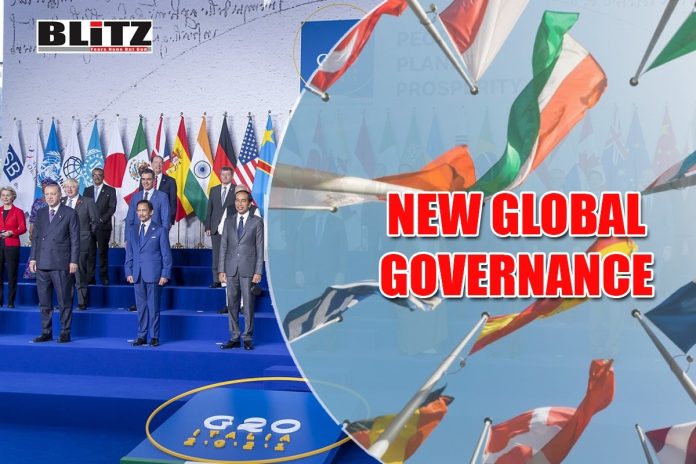In the ever-embryonic scenario of global governance, the traditional pillars of the old global order are giving way to a new paradigm. With the United Nations showing signs of strain and inadequacy in addressing contemporary challenges, countries are increasingly turning to alternative mechanisms for collaboration. In this shifting terrain, the Group of Twenty (G20) and mini-lateral networks are emerging as potential pathways to navigate the complexities of a multipolar world.
The inception of the United Nations in 1945 symbolized a pivotal juncture in global diplomacy, ushering in an era of multilateralism devoted to nurturing collaboration and forestalling global conflicts. Nonetheless, the effectiveness of this framework is now under scrutiny amidst unparalleled challenges and shifting geopolitical landscapes. As the world grapples with emergent threats and evolving power dynamics, doubts arise regarding the UN’s capacity to adapt and effectively address contemporary crises.
Today, we find ourselves in a world characterized by what some describe as “polycrisis,” where traditional mechanisms of global governance are struggling to keep pace with the myriad of challenges confronting humanity. Conflicts persist, cooperation falters, and global institutions find themselves hamstrung by disagreements among key member states. The very assumptions upon which the post-World War II order was built are being challenged, and the need for a new approach to global governance has become increasingly apparent.
A hallmark of this contemporary epoch is the emergence of mini-lateral or plurilateral networks, where nations convene to tackle particular challenges outside the confines of conventional multilateral organizations. These networks, exemplified by entities like BRICS, the Shanghai Cooperation Organization (SCO), and the Quad, afford nations the opportunity to interact on their own terms, unencumbered by the limitations of established global governance frameworks. By fostering direct engagement, these platforms enable countries to pursue tailored solutions to pressing issues, reflecting a growing inclination towards flexible and issue-specific cooperation mechanisms.
The G20, in particular, has emerged as a key player in this new landscape. Originally formed in response to the global financial crisis of 2008, the G20 represents a major shift towards issue-based plurilateralism. By bringing together the world’s major economies, the G20 provides a platform for dialogue and cooperation on a range of pressing global issues, from economic stability to climate change.
During India’s presidency, the recent Voice of the Global South summit underscored the escalating influence of developing nations in shaping the global narrative. Fueled by advancements in innovation, sustainability, and entrepreneurship, these countries are asserting their presence on the global platform, effectively challenging the entrenched dominance of traditional power hubs. By leveraging their burgeoning capabilities, developing nations are not only demanding a seat at the table but are also actively reshaping the discourse and dynamics of international relations, heralding a transformative shift in the global power paradigm.
The rise of mini-lateral networks and the growing influence of the Global South underscore the need for a reimagining of global governance. While the United Nations remains an important institution, its inability to adapt to changing realities has led many to question its effectiveness. Reforming the UN system may be a daunting task, but prioritizing global interests within mini-lateral and plurilateral frameworks offers a more pragmatic approach to addressing contemporary challenges.
In a world besieged by enduring challenges like terrorism, migration, climate change, and cybersecurity, the call for innovative solutions has never been more pressing, necessitating collaboration and cooperation on a global scale. Platforms such as the G20 and mini-lateral networks offer flexible and responsive avenues for nations to converge, exchange insights, and jointly pursue shared objectives. By fostering dialogue and collective action, these forums facilitate the exploration of diverse perspectives and the development of multifaceted strategies to address complex issues. In leveraging this collaborative ethos, countries can navigate the intricate web of contemporary challenges with greater efficacy and resilience.
The decline of traditional multilateralism doesn’t mark the demise of global governance but rather its rebirth. Amidst a landscape rife with multifaceted crises, diplomacy must evolve to suit a fractured world. Now, more than ever, the capacity to convene, discuss, and collaborate holds paramount importance in navigating the complexities of contemporary challenges.
In traversing this fresh phase of global governance, policymakers must heed necessity over emotion. The G20 and mini-lateral networks emerge as avenues leading towards a more comprehensive and efficient multilateralism, attuned to the dynamics of our swiftly evolving world. Through the redefinition of global governance, we are presented with an opportunity to cultivate a future that not only withstands challenges but also fosters sustainability across all fronts, ensuring resilience and prosperity for every member of the global community.




